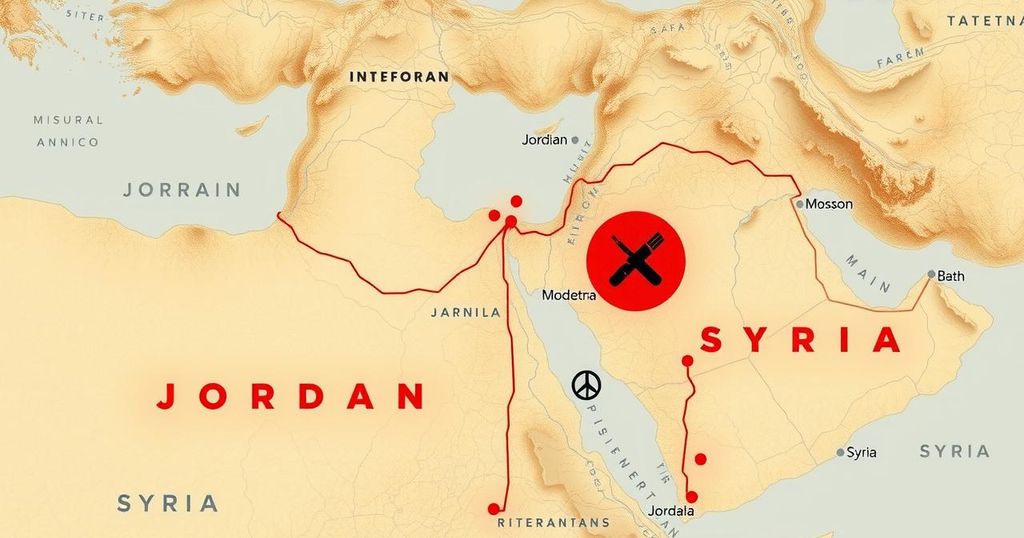Voluntary Land Swaps: A Path to Mideast Stability

Voluntary land swaps offer a potential solution for instability in the Middle East, primarily benefiting Jordan and Israel. Historical border issues coupled with rising threats prompt a reevaluation of strategic advantages. By trading land, Jordan can enhance security while improving its economic prospects, thus rejuvenating its leadership role in the Arab world. The opportunity is ripe for decisive leadership to take action.
In the context of the often chaotic Middle Eastern landscape, a fresh idea has emerged: voluntary land swaps that could enhance regional stability. This notion springs from several factors, including the end of a long-standing Syrian regime, shifts in U.S. leadership under Donald Trump, and evolving threats to Arab nations, particularly Jordan. As a key U.S. ally, Jordan’s stability is critical not just for its own survival but for broader interests shared by Israel and the West.
The historical backdrop is essential here. Jordan’s borders were largely shaped by French colonial ambitions in the 1920s, following the collapse of an Arab kingdom. Post-colonial delineations handed over lands to the Hashemite family, creating a geopolitical map that has invited turmoil. During the 20th century, Jordan faced threats primarily from Israel, with notable conflicts in 1948 and 1967, whereas its eastern and northern borders appeared secure.
Fast forward to today—there’s a significant shift. Instead of relying on Israel for security, the looming dangers now come from the east and north: Iran, various extremist groups, and resurgent Turkish influence pose real threats. Alarmingly, Jordan’s experiences recently, such as the swift changes in Syria and the advancing forces within its own borders, have raised concerns about its security landscape.
To bolster its defense, Jordan might need to look westward, trading parts of its territory for strategic areas in southern Syria. Such a trade wouldn’t just redeploy its military focus but could meaningfully expand its territory, create new economic opportunities, and revitalize its role in the Arab world, possibly recalling its historic roots in southern Syria.
On the other hand, Israel finds its security framework increasingly vulnerable. The recent events on October 7 and the ensuing instability in Syria highlight that the Jordan River may no longer serve as a strong defensive boundary. The current technology and geographical challenges reveal flaws in relying on existing borders to fend off organized military threats from neighboring foes.
The assessment posits that Israel must reconsider and potentially shift its defensive line eastward. This could mean establishing a presence in southern Syria or employing Jordanian troops in a strategic partnership to secure both nations. It’s clear the threats on the horizon necessitate greater cooperation and an adjustment of territories.
Moreover, this proposed land swap could lead to an economic renaissance for Jordan and Syria, contributing to regional stability. Such a vision includes turning the barren Syrian desert into thriving agricultural lands, oft referred to as “the California of the Middle East.” The creation of this new economic landscape could incentivize migrations and rehabilitate the broader region through enhanced labor and investment opportunities.
Critically, the swap wouldn’t need population relocations or complex citizenship movements, making the logistics more manageable while ensuring stability. Simultaneously, this could enhance security for Israel by bolstering defenses along its borders while providing a buffer between hostile neighbors and Jordan.
This plan, however, isn’t exactly about the Palestinian issue directly. Proponents of Palestinian rights might find common ground in the new security dynamics, as shifts in territorial control could lessen resistance to Palestinian initiatives on the West Bank.
Importantly, while these changes could signify a strategic realignment of borders, they need a strong leadership backbone to bring them to fruition. Effective negotiation will require discreet discussions facilitated by trusted leaders, potentially under the auspices of someone like Trump, who has shown a unique capacity to navigate these complex relationships. His administration has already demonstrated the ability to foster alliances and deliver impactful change in the Middle East.
Ultimately, this perspective is not merely theoretical. For real progress, bold ideas must be converted into actionable strategies by those with the influence and resolve to make them happen. The implications could redefine not just Jordan and Israel but the entire regional framework, paving the way for a peace that breaks free from the cycles of conflict.
In conclusion, the idea of voluntary land swaps between Jordan and Israel presents a pathway for improved regional stability and security. Given the shifting geopolitical landscape, such exchanges could foster economic growth, strengthen borders, and enhance mutual defense against rising threats. However, for these ideas to become a reality, decisive leadership and strategic negotiation will be paramount. Only through strong diplomacy can these bold suggestions transform into lasting solutions for the Middle East’s complex challenges.
Original Source: www.jpost.com







